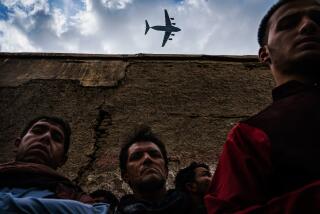NONFICTION : AMERICA’S WARS AND MILITARY EXCURSIONS by Edwin P. Hoyt (McGraw-Hill: $24.95; 560 pp.).
- Share via
In a time of Persian Gulf confrontation, turmoil in Central America and continuing Soviet-U.S. tension, this book is both timely and stimulating. It reminds us that our country has been at war or at least in conflict somewhere in the world for much of its history.
In this survey of America’s military past, author Edwin P. Hoyt, journalist and professional writer, has wisely included not only wars but also those “military excursions” and “police actions” we’ve engaged in. We learn that war and military excursions are more often the rule than the exception in our history. Hoyt gives a fascinating survey of military actions from American Colonial wars, through the American Revolution, the naval fighting with France and the North African pirates, with England again in the war of 1812, efforts against the Indians throughout the 19th Century, the conflict of American expansion--war with Mexico, the internal Civil War, naval seizures of islands in the Pacific and Caribbean, U.S. participation in the opening of Japan and China, World War I, actions in Latin America, and efforts at collective action after World War II.
Readers will differ over which parts they find most interesting. For me, the best chapters dealt with the Korean and Vietnam conflicts. Both were fought in distant lands in Asia. Both marked a change in U.S. military operations and technology. In both, our aims were fuzzy and the result was defeat or stalemate.
“The impact of Vietnam,” as Hoyt sees it, “was enormous” not only in terms of lives and expense, but in the rise of the new medium of television, “which had come to rule the American home,” put the war into the family living room and vastly increased the influence on public opinion of TV anchor men and reporters. Further, “suspicion, disbelief, loss of confidence of Americans in their government and in the media, and a new isolationism were the heritage of Viet Nam.”
More recent conflict in Nicaragua and the Iran- contra hearings have simply reinforced these effects. The lesson remains clear--eternal vigilance is as essential today to preserve democracy as it was in Jefferson’s day.
More to Read
Sign up for our Book Club newsletter
Get the latest news, events and more from the Los Angeles Times Book Club, and help us get L.A. reading and talking.
You may occasionally receive promotional content from the Los Angeles Times.








